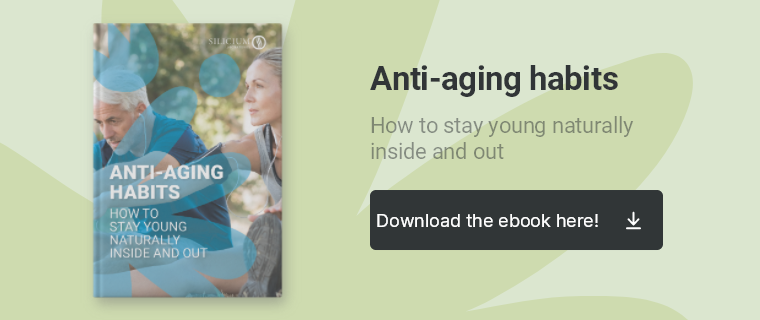
Menopause: natural treatment and guidelines for a healthy lifestyle
Hot flushes, night sweats, insomnia, loss of sexual appetite, vaginal dryness, osteoporosis… It sounds like a nightmare, but many women suffer these symptoms with the onset of the menopause.
Hormone therapy is one of the most popular treatments to alleviate its effects; however, the possible risks involved mean that more and more women are opting to tackle the menopause with natural treatment.
In this article we tell you how to cope with the menopause with natural treatment and healthy lifestyle habits.
Symptoms of menopause
Menopause is the time in a woman’s life when menstruation disappears. It usually occurs after the age of 45 and is caused by a reduced production of the hormones oestrogen and progesterone. It is important to note that it lasts between 2 and 5 years and in no case are its symptoms here to stay.
A woman reaches menopause when she completes one year without menstruation. The changes that herald it, however, may appear several years earlier. They are as follows:
- Changes in menstruation
- Mood changes
- Hot flashes and night sweats
- Insomnia
- Vaginal dryness
- Difficulty in maintaining concentration
- Loss of hair and more facial hair
As a general rule, blood tests are not necessary to diagnose menopause. However, in certain cases, the doctor is likely to order a test to check values for:
- Follicle-stimulating hormone and oestrogen. Follicle-stimulating hormone usually increases with menopause and oestrogen decreases.
- Thyroid-stimulating hormone, which when low can cause symptoms very similar to those of menopause.
These tests are useful in cases where the menopause seems to have come early – early menopause – and the doctor wants to rule out other possible conditions.
Menopause: conventional treatment
Hormone replacement therapy is the treatment traditionally prescribed by a gynaecologist for a woman in menopause. It is an oestrogen-based therapy that is effective in relieving hot flushes.
Oestrogen can also be applied directly to the vagina – in the form of a gel, tablet or ring – which in turn can improve dryness.
However, hormone treatment is counterproductive in cases of a family history of breast cancer, as well as a personal history of thrombosis and hormone-dependent tumours.
Another recurrent treatment is the use of low-dose antidepressants to alleviate hot flushes.

Menopause: alternative treatment
The alternative is menopause with natural treatment. To alleviate the symptoms, it is common to recommend:
- Soya, for its isoflavones, as they contain phytoestrogens that can behave like oestrogens in our bodies.
- Cimicífuga, which acts on the neurotransmitters that cause menopausal symptoms.
- Sage, which has the property of controlling excessive sweating. It is often found in combination with hops.
- Evening primrose oil, which is rich in omega-6 fatty acids gamma-linoleic acid, appears to reduce the intensity of hot flushes.
- Vitamin E may relieve symptoms of mild hot flushes.
Mitigating the symptoms of menopause
In addition to natural treatment, you can improve menopausal symptoms with healthy lifestyle habits such as:
- Getting regular aerobic exercise. You don’t need to join a gym, going for a brisk walk every day, for about 30 minutes, is very beneficial. Exercise maintains muscle mass, prevents weight gain and helps with osteoporosis. In addition, you rest better after an active day.

- Eat a healthy diet. Some women associate hot flushes with hot, spicy, stimulating or difficult to digest foods and drinks. All the more reason to take care of your diet. During the menopause it is a good idea to enrich your diet with foods that contain calcium, such as skimmed dairy products, pulses, vegetables and wholegrain cereals. Fish, which provides essential omega-3 fatty acids, is very useful for preventing cardiovascular disease.
- Do not smoke. Women smokers are at greater risk of osteoporosis or heart and lung disease.
- Maintaining an active sex life will result in less vaginal dryness, as the genital area is more vascularised.
- Protect and strengthen the pelvic floor. This can be achieved by performing kegel exercises and also hypopressive exercises. Strengthening the pelvic floor helps avoid urinary incontinence and genital prolapse.
- Increase intellectual activities such as reading, studying, conversation, going to the theatre, etc.
- Taking natural supplements that improve our well-being.
Benefits of silicon in menopause
Did you know that taking an organic silicon supplement can help with menopausal symptoms? Given the benefits of silicon, taking a recommended dose will improve your overall health. In addition, in relation to menopause, silicon helps to prevent osteoporosis, improve the elasticity of tissues and ligaments and eliminate toxins.
We recommend two organic silicon-based supplements that can perfectly treat menopause with a natural approach.
- G7 Beauty, in addition to organic silicon, contains vitamin E, a trace element recommended for menopause. This supplement slows down ageing, improves nails, hair and moisturises the skin. It also reduces sun spots. Vitamin E and selenium are powerful antioxidants that improve skin appearance and protect cells from oxidative damage.
- Loïc Ribaut’s original formula, Silicium G7 Original. It can help delay ageing and provide joint well-being. It also improves the appearance of the skin and has an anti-ageing effect. It repairs brittle nails and regenerates hair.
The menopause is perhaps not one of the most bearable stages of a woman’s life. However, thanks to what we now know about it and the possibility of living through the menopause with natural treatment, you will be able to mitigate the annoying symptoms and get through this stage in the best possible way. Just think that, sooner or later, you will continue to be the same as always.
There are no comments yet




Leave a comment